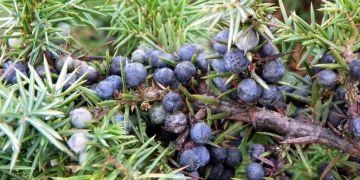Natural Habitat
Juniper is an evergreen tree that grows wild throughout parts of Europe, Asia, and North America. Though there are many varieties of juniper, the most common in North America is the Juniperus communis. This particular tree grows up to 10 feet tall and has needle-like leaves and seed cones. The medicinal parts of the juniper tree are known as berries but are actually the dark blue-black scales that come from the cones. Scales from the male juniper ripen in 18 months while scales from the female juniper ripen within 2 to 3 years.
Health Benefits
Juniper Essential Oil
Extracts and essential oils from the juniper berries/scales contain terpinen-4-ol, a compound that stimulates the kidneys and acts as a diuretic. Amentoflavone, another compound, has antiviral properties.
The essential oils of juniper also prove beneficial when inhaled. Inhalation of juniper is used to treat bronchitis and act as a pain reliever that numbs pain. The use of juniper is not limited to medicinal use. The essential oils in juniper have a turpentine-like smell and a bitter taste. It is often used as a condiment or a flavoring for foods and beverages such as gin and bitters. Juniper can also be found in some cosmetics like lipstick, foundation, eye shadow, hair conditioner, bubble bath, and bath oil.
Ingesting Juniper
Ingested forms of juniper assist with inflammation and increase production of stomach acid, making them useful remedies to help soothe the gastrointestinal system. It is a helpful treatment for conditions such as upset stomach, heartburn, flatulence, bloating, loss of appetite, gastrointestinal infections, and intestinal worms. The antiseptic properties in juniper disinfect the urinary tract to provide treatment and relief for conditions like urinary tract infections, urethritis, kidney stones, and bladder stones. Juniper also acts as a diuretic to help flush excess fluids from the body. This helps rid the body of excess uric acid which can lead to gout. It also reduces fluid around the joints. Ingested juniper is high in natural insulin and therefore lowers blood sugar levels. It can also help heal the pancreas as long as no permanent damage has occurred on the organ. Juniper also alleviates problems associated with menstruation.
Topical applications
Juniper can also be applied topically to treat skin ailments and conditions. It is used to treat conditions like acne, athlete's foot, warts, skin growths, cystitis, psoriasis, and eczema. Cade oil, which comes not from the berries but from the tree's wood, is particularly helpful in treatment of psoriasis on the scalp. Moreover, antibacterial properties make juniper a treatment for skin wounds and snakebites. Topical application also provides relief for joint and muscle pain and is especially helpful to those suffering from arthritis and rheumatism.
How to Take Juniper
Juniper is available in many forms, such as teas, capsules, ointments, or lotions. Tea is generally used for digestive problems while oils are often reserved for use in hot baths for inhalation. Short-term use of 1000 to 2000 mg. per day divided into 2 to 3 doses for up to 6 weeks is generally considered safe for most people.





